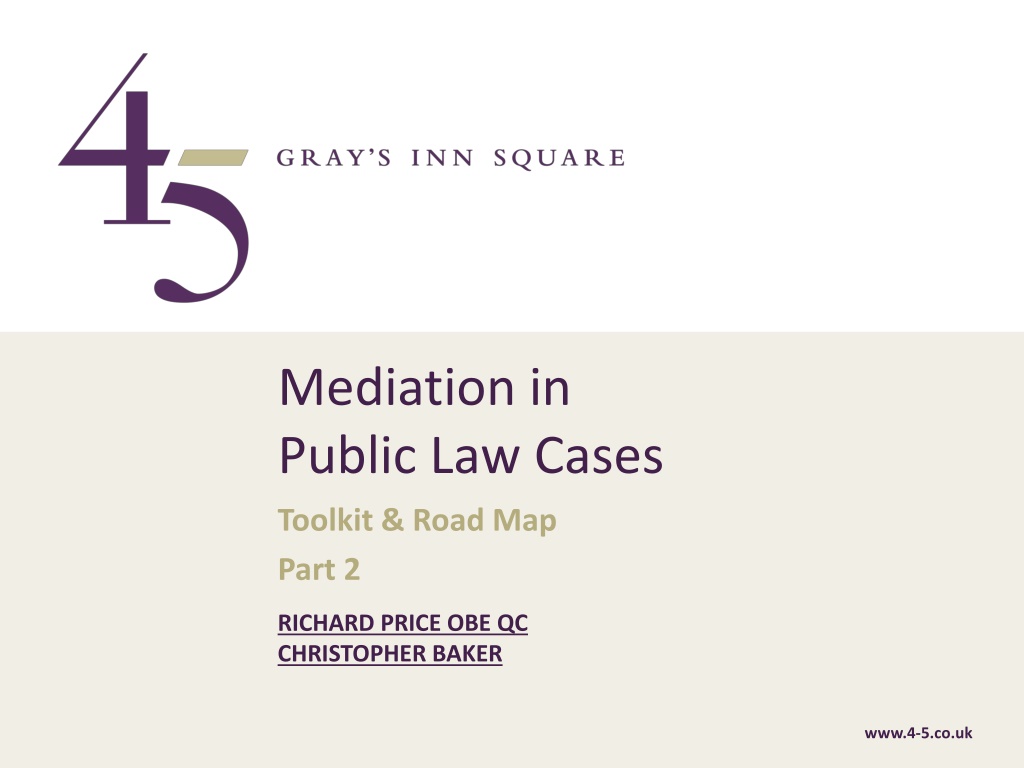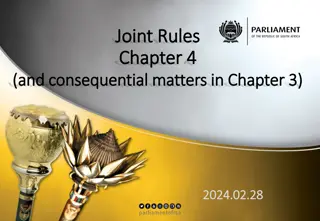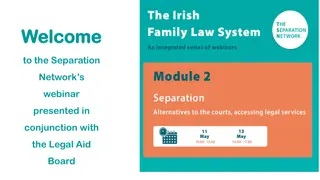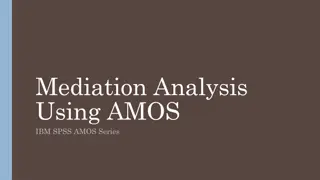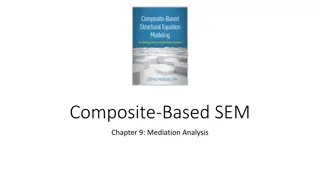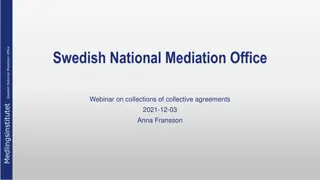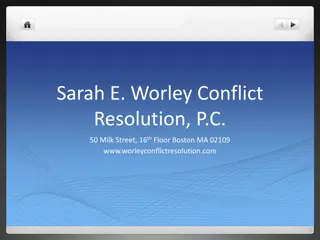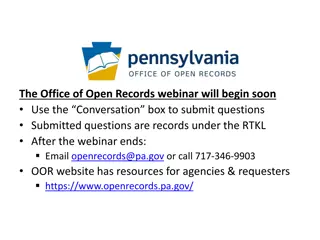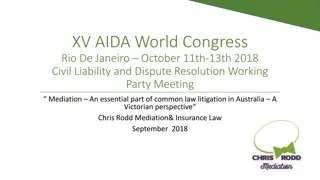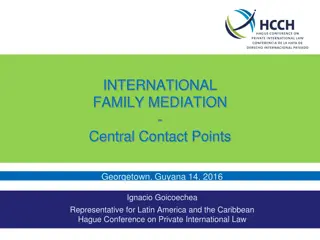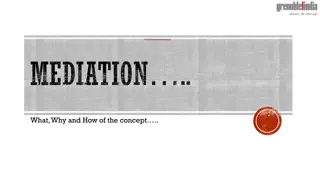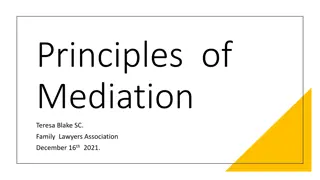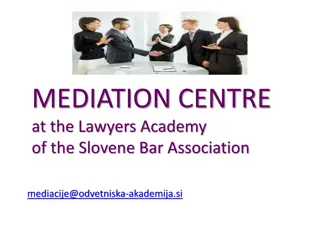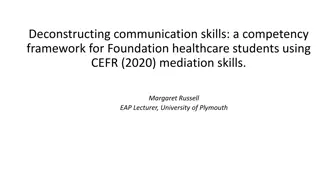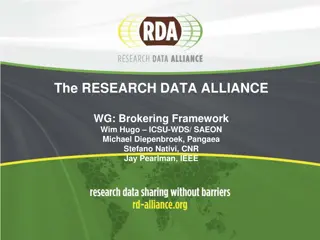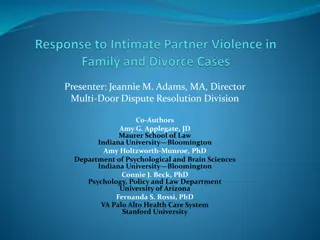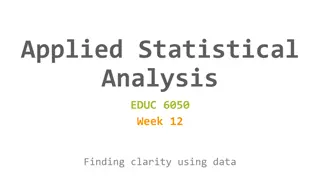Mediation in Public Law Cases Toolkit & Road Map Part 2
This toolkit and road map aim to facilitate successful mediation in public and administrative law disputes, including judicial review claims. It provides a legal framework for utilizing mediation effectively in these cases, highlighting the benefits and potential where traditional legal means may fall short. The content covers insights on limitations in judicial review cases, cost implications, and the importance of mediation in resolving disputes beyond legal confines. The toolkit is designed to assist litigators and mediators in enhancing their mediation practices in the public law domain.
Download Presentation

Please find below an Image/Link to download the presentation.
The content on the website is provided AS IS for your information and personal use only. It may not be sold, licensed, or shared on other websites without obtaining consent from the author.If you encounter any issues during the download, it is possible that the publisher has removed the file from their server.
You are allowed to download the files provided on this website for personal or commercial use, subject to the condition that they are used lawfully. All files are the property of their respective owners.
The content on the website is provided AS IS for your information and personal use only. It may not be sold, licensed, or shared on other websites without obtaining consent from the author.
E N D
Presentation Transcript
Mediation in Public Law Cases Toolkit & Road Map Part 2 RICHARD PRICE OBE QC CHRISTOPHER BAKER www.4-5.co.uk www.4-5.co.uk
TOOLKIT & ROAD MAP This 3-part toolkit & road map sets out the legal framework underpinning the use of mediation in public and administrative law cases and provides a checklist of points for successful use of mediation in these cases. Release dates: Toolkit - Part 1 Monday 13th May 2019 Available here Toolkit Part 2 Monday 20th May 2019 Road Map Tuesday 28th May 2019 We hope this series will help both litigators and mediators use mediation more effectively in public law cases. www.4-5.co.uk
INDEX TOOLKIT PART 2 INTRODUCTION LIMITS TO THE PRACTICAL SCOPE OF JUDICIAL REVIEW CASES WHERE MEDIATION HAS ADDED VALUE EMPIRICAL RESEARCH COSTS AND FAILURE TO MEDIATE www.4-5.co.uk
INTRODUCTION Our toolkit and road map are intended to help unlock the significant potential for successful mediation in public and administrative law disputes, including judicial review claims. Public bodies of all kinds and the organizations and individuals with whom they interact and their respective lawyers should make much fuller use of the benefits of mediation in this field. The greatest scope for this is in relation to disputes where there is something to be resolved beyond the ordinary legal confines of the court s jurisdiction. In part, responsibility may lie with the mediators themselves for the unexplored and untapped potential. Few mediators or their professional bodies highlight involvement in public and administrative law disputes. They tend to concentrate on areas such as commercial, consumer, workplace and family disputes. It is perhaps true that relatively few mediators have a wealth of experience and understanding about public law, public administration or judicial review procedure. This is where 4-5 s Mediation Group can help. This toolkit sets out the key elements of the legal framework which underpin the use of mediation in public and administrative law cases. The road map which follows contains a checklist of points for successful use of mediation in these cases. We hope that our toolkit and road map help both litigators and mediators use mediation more effectively in this field. This in-depth article is in three parts, being published sequentially. RICHARD PRICE OBE QC CHRISTOPHER BAKER www.4-5.co.uk
LIMITS TO THE PRACTICAL SCOPE OF JUDICIAL REVIEW Alongside the general drive under the CPR towards ADR, judges in Judicial Review cases have not infrequently had occasion to criticise claimants use of JR as an attempt to achieve a substantive outcome or continuing supervision beyond the proper remit of the court s supervisory jurisdiction. This has been a particular feature of cases involving welfare provision. In a number of cases, particularly involving children, Munby J expressed his concerns about the use of judicial review to challenge social services authorities about provision under the Children Act 1989: see egR (P and others) v Essex CC [2004] EWHC 2027 (Admin) at [30] onwards and R(B) v Lambeth LBC [2006] EWHC 639 (Admin); [2007] 1 FLR 2091 at [26] onwards. In the earlier case, Munby J said (emphasis added): 30. The present litigation exemplifies a certain type of judicial review case which experience suggests can too often end up following a less than desirable course: I have in mind community care, housing and other cases involving either children or vulnerable adults, especially those where, as here, the first task of the local or other public authority is the preparation of an assessment. 31. This is not the first time that I have felt impelled to express my unease about this particular type of litigation There is, I think, a problem here that needs to be addressed. Too often in my experience inadequate thought is given to what precisely the court is being asked or can properly be asked to do. 32. The court's function in this type of dispute is essentially one of review rather than of primary decision making. It is not the function of the court itself to come to a decision on the merits. The court is not concerned to come to its own assessment of what is in these children's best interests. 5 www.4-5.co.uk
LIMITS TO THE PRACTICAL SCOPE OF JUDICIAL REVIEW 33. Although I am, in a sense, concerned with the future welfare of very vulnerable children, I am not exercising a best interests or welfare jurisdiction, nor is it any part of my functions to monitor, regulate or police the performance by the County Council of its statutory functions on a continuing basis. [T]he Administrative Court exists to adjudicate upon specific challenges to discrete decisions. It does not exist to monitor and regulate the performance of public authorities . These cases serve to illustrate how (as we consider further, below) mediation can deal with disputes and achieve outcomes far beyond the scope of litigation, particularly Judicial Review. In cases where substantive decisions need to be taken, or continuing arrangements made, mediation will invariably provide a more effective vehicle for resolution. In Judicial Review, it will usually be the case that the most the court could do at the conclusion of the proceedings would be to quash a decision or policy and remit the matter to the defendant to have another go. Experience tends to indicate that the reconsideration which follows often arrives at the same result. 6 www.4-5.co.uk
CASES WHERE MEDIATION HAS ADDED VALUE One of the present authors mediated a difficult and harrowing case, in which the claimant was a tetraplegic, in need of long-term continuing care from the NHS and suitable accommodation from the local authority. She suffered from a psychological condition which hampered the provision of physical care but had litigation capacity and was able to give instructions to her lawyers. The case had previously been before the courts, including the Court of Appeal, on an unsuccessful application for Judicial Review. A fresh judicial review application was threatened for alleged breaches of s3 National Health Service Act 2006. The mediation was arranged in the hope of agreeing a clear way forward in the provision of the care that all parties accepted was required. It took place at the pre-action protocol stage, where the process had got stuck. The available current and historical evidence was voluminous. The mediation process brought the parties and their lawyers together. The claimant was able to be involved in the process by means of a Skype link to her lawyers room. The NHS trust attended by two key decision makers. The involvement of all relevant parties, and key decision makers was crucial. It proved possible for lengthy discussions to take place in joint sessions, with private sessions when required. The result was that the parties were able to agree a road map for the provision of future care which was acceptable to the claimant. This had the effect of removing the threat of judicial review proceedings, and of achieving a plan for the future which the court would have been able to provide. The saving of costs spoke for itself. The research referred to below similarly includes various further examples of cases in which mediation has been successful in Judicial Review proceedings. These include the case of a girl with severe learning difficulties, who was sexually abused at the care home, and at a day centre. She told her parents what had happened, and they took the girl back to live at the family home. There was a complete breakdown of the relationship with the local authority, whom the parents blamed for what had happened. Judicial Review and a damages claim was threatened. With the help of a very experienced mediator, a temporary care plan was agreed, and the threat of litigation was lifted. A road map for the future was agreed. 1 Bondy and Doyle, below, Appendix 1. www.4-5.co.uk
EMPIRICAL RESEARCH There is relatively little research into the use or impact of mediation in relation to Judicial Review. A study published some time ago in 2009, Mediation and Judicial Review: An empirical research study, found that while public law practitioners had extensive experience of the negotiation and successful resolution of judicial review claims , with evidence showing most cases settling, there is little recourse to mediation among public law practitioners . Another study had found that less than 6% of public law practitioners had either considered the possibility of using mediation in any of their cases or had actually participated in a mediation of a public law dispute. On the other hand, the 2009 study also concluded that the drive by policy-makers towards mediation was not based on evidence and that claims made for mediation being quick and cheap justice were not supported in practice in judicial review claims. It did confirm, however, that: it is clear from our case studies and interviews that mediation can be a useful process where negotiations are impossible, difficult or have broken down ; and mediation enabled underlying issues in a dispute to be teased out and all the successful mediations resulted in outcomes that gave claimants more than they would achieved had they been successful at court . In an attempt to address the gap in legal practitioners understanding of how mediation can be used as an alternative to, or alongside, judicial review, the sponsors of the 2009 study also supported the publication in 2011 of the informative Mediation in Judicial Review: A practical handbook for lawyers. In his foreword, the late Sir Henry Brooke said: It would be nice to think that in future years a party s representatives will have consulted this guide before they say No to a request for mediation in the judicial review field. They will be missing a lot if they don t. 2 Bondy and Mulcahy, for the Nuffield Foundation and the Public Law Project 3The Dynamics of Judicial Review Litigation: The resolution of public law challenges before final hearing, Bondy and Sunkin, Public Law Project (2009). www.4-5.co.uk
COSTS AND FAILURE TO MEDIATE The issue of costs is one of the most commonly encountered areas of dispute in Judicial Review cases. For present purposes, there are two main aspects. First, as the Pre-Action Protocol provides at para 12: If proceedings are issued, the parties may be required by the court to provide evidence that ADR has been considered. A party s silence in response to an invitation to participate in ADR or refusal to participate in ADR might be considered unreasonable by the court and could lead to the court ordering that party to pay additional court costs. Serious costs sanctions in cases involving public bodies pre-date the Protocol. In Dunnett v Railtrack plc [2002] EWCA Civ 303; [2002] 1 WLR 2434, the Court of Appeal made no order for costs even though Railtrack had been successful in defending at trial and on appeal a claim brought against it, because it had rejected the claimant s proposal of ADR out of hand. Brooke LJ said at [14]: Skilled mediators are now able to achieve results satisfactory to both parties in many cases which are quite beyond the power of lawyers and the courts to achieve . In Halsey v Milton Keynes General NHS Trust; Steel v Joy [2004] EWCA Civ 576, [2004] 1 WLR 3002, while rejecting the proposition that truly unwilling parties could be obliged to refer disputes to mediation, the Court of Appeal set out factors to be borne in mind when considering whether a party had acted unreasonably in refusing ADR. On the facts, orders for costs in favour of successful defendants were upheld despite refusal of invitations to mediate. But the Court of Appeal endorsed the principle that the courts can deprive a successful party of their costs, if the court considers that they have unreasonably refused to consider mediation: All members of the legal profession who conduct litigation should now routinely consider with their clients whether their disputes are suitable for ADR. But we reiterate that the court's role is to encourage, not to compel. The form of encouragement may be robust (Dyson LJ at [11]). www.4-5.co.uk
COSTS AND FAILURE TO MEDIATE One of the factors likely to be relevant is proportionality of legal costs to the claim and the relative costs of mediation. In Burchell v Bullard [2005] EWCA Civ 358; [2005] CP Rep, the Court of Appeal would have imposed a costs sanction for refusal to mediate in a relatively small dispute which became dwarfed by the costs, declining to do so only because the offer and refusal of mediation occurred before Dunnett and Halsey. At [43]. however, Ward LJ said: The court has given its stamp of approval to mediation, and it is now the legal profession which must become fully aware of and acknowledge its value. The profession can no longer with impunity shrug aside reasonable requests to mediate. The parties cannot ignore a proper request to mediate simply because it was made before the claim was issued. The Halsey guidelines were extended in PGF ll SA v OMFS Company 1 Ltd [2013] EWCA Civ 1288; [2014] 1 WLR 1386 in which the Court of Appeal heldthat a failure to respond at all to an invitation to participate in ADR was itself unreasonable, regardless of whether there was good reason to refuse ADR. The claimant had accepted the defendant s Pt 36 offer only shortly before trial and the Court of Appeal upheld the judge s refusal to order the claimant to pay the defendant s costs which would ordinarily have resulted from late acceptance of the offer, because the defendant had remained silent in the face of the claimant s offer to mediate. Cowl, Halsey and PGF II were all considered in R (Crawford) v Newcastle upon Tyne University [2014] EWHC 1197 (Admin) where a university student had issued judicial review proceedings against his university while simultaneously pursuing a complaint to the Independent Adjudicator for Higher Education, both of which were unsuccessful. The court held that the defendant was not to be deprived of its costs for failing to respond to the claimant s invitation to attempt mediation because the adjudication process was effectively a form of ADR. www.4-5.co.uk
COSTS AND FAILURE TO MEDIATE A striking example of a costs sanction being imposed is to be seen in Thakkar v Patel [2017] EWCA Civ 117; [2017] 2 Costs LR, where the Court of Appeal upheld what it described as the judge s tough order on costs. Although both sides had expressed a willingness to mediate, the claimants had taken active steps, but the defendants had dragged their feet to the point where mediation was abandoned. The case had clearly been suitable for mediation, and there was a real prospect that it would have achieved a result. The court held that the judge was entitled to take the view that most of the blame for failure to mediate lay with the defendants, and to reflect that in his costs order. Jackson LJ said at [31]: The message which this court sent out in PGF II was that to remain silent in the face of an offer to mediate is, absent exceptional circumstances, unreasonable conduct meriting a costs sanction, even in cases where mediation is unlikely to succeed. The message which the court sends out in this case is that in a case where bilateral negotiations fail but mediation is obviously appropriate, it behoves both parties to get on with it. If one party frustrates the process by delaying and dragging its feet for no good reason, that will merit a costs sanction. In the present case, the costs sanction was severe, but not so severe that this court should intervene. www.4-5.co.uk
4-5 Mediation Group Putting people and client service first London 4-5 Gray s Inn Square Gray s Inn London WC1R 5AH DX No 1029 LDE Birmingham 2nd Floor Two Snow Hill Birmingham B4 6GA clerks@4-5.co.uk Tel +44 (0)20 7404 5252 clerks@4-5.co.uk Tel +44 (0)121 231 7430 www.4-5.co.uk www.4-5.co.uk
